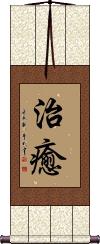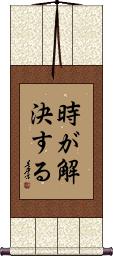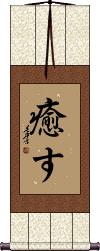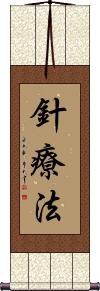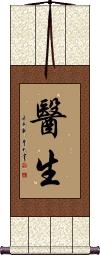Many custom options...
And formats...

Not what you want?
Try other similar-meaning words, fewer words, or just one word.
The Cure in Chinese / Japanese...
Buy a The Cure calligraphy wall scroll here!
Personalize your custom “The Cure” project by clicking the button next to your favorite “The Cure” title below...
Cure
治癒 is the Chinese, Japanese Kanji, and old Korean Hanja for cure, healing, and/or recovery.
Time Heals All Wounds
Heal / Healing
Healing Hands
癒しの手 can be translated as “healing hands” in Japanese.
The first two characters mean healing, to heal, to cure, soothing, therapy, comfort, and solace.
The third character is a possessive particle that connects the ideas.
The last Kanji means hand or hands.
Note: Because this selection contains some special Japanese Hiragana characters, it should be written by a Japanese calligrapher.
Acupuncture
針療法 is one of two ways to write acupuncture in Chinese and Japanese.
The first character means “needle” or “pin.” The second character means “to treat” or “to cure.” The last character means “method” or “way.”
This is the only reasonable selection if your audience is Japanese. This is the formal way to express acupuncture in Chinese, so this version is universal in most of Asia (the best all-around choice in most cases).
Healing Hands
妙手回春 can be translated as “healing hands.”
The first two characters are used to describe a doctor or medical professional who has admirable skills in curing disease. Literally: Wonderful or skilled hands.
The last two characters mean “Springing back to life.”
Altogether, it suggests that these skilled hands can cure whatever ails you and bring you back to life. 妙手回春 is a great honor to bestow on your doctor or other healthcare professionals that have helped you.
Doctor
醫生 is the title used to refer to medical doctors or physicians in China.
Note: Sometimes, this same term is used in Korean, but not common.
The meaning is close to “healer [of] life” as the first character, 醫, can mean medicine, the healing art, healing, curing, medical, to cure, or to treat. The second character, 生, means birth or life.

 In Japan, they use a simplified version of the first character (医生 is also used as the Simplified Chinese version of Doctor). If you want this version, please click the characters to the right instead of the button above.
In Japan, they use a simplified version of the first character (医生 is also used as the Simplified Chinese version of Doctor). If you want this version, please click the characters to the right instead of the button above.
Not the results for the cure that you were looking for?
Below are some entries from our dictionary that may match your the cure search...
| Characters If shown, 2nd row is Simp. Chinese |
Pronunciation Romanization |
Simple Dictionary Definition |
治癒 治愈 see styles |
zhì yù zhi4 yu4 chih yü chiyu ちゆ |
More info & calligraphy: Cure(n,vs,vi) healing; cure; recovery |
癒す see styles |
iyasu いやす |
More info & calligraphy: Heal / Healing |
妙手回春 see styles |
miào shǒu huí chūn miao4 shou3 hui2 chun1 miao shou hui ch`un miao shou hui chun |
More info & calligraphy: Healing Hands |
時が解決する see styles |
tokigakaiketsusuru ときがかいけつする |
More info & calligraphy: Time Heals All Wounds |
転ばぬ先の杖 see styles |
korobanusakinotsue ころばぬさきのつえ |
More info & calligraphy: Have a Walking Stick at the Ready Before You Stumble |
治 see styles |
zhì zhi4 chih haru はる |
to rule; to govern; to manage; to control; to harness (a river); to treat (a disease); to wipe out (a pest); to punish; to research (1) (rare) politics; government; administration; rule; (2) (rare) (See 治に居て乱を忘れず) (ant: 乱) peace; (3) (archaism) medical treatment; cure; (surname, given name) Haru Rule, govern; prepare; treat, cure; repress, punish. |
滅 灭 see styles |
miè mie4 mieh metsu |
to extinguish or put out; to go out (of a fire etc); to exterminate or wipe out; to drown Extinguish, exterminate, destroy; a tr. of nirodha, suppression, annihilation; of nirvāṇa, blown out, extinguished, dead, perfect rest, highest felicity, etc.; and of nivṛtti, cessation, disappearance. nirodha is the third of the four axioms: 苦, 集, 滅, 道 pain, its focussing, its cessation (or cure), the way of such cure. Various ideas are expressed as to the meaning of 滅, i.e. annihilation or extinction of existence; or of rebirth and mortal existence; or of the passions as the cause of pain; and it is the two latter views which generally prevail; cf. M017574 10 strokes. |
療 疗 see styles |
liáo liao2 liao ryō |
to treat; to cure; therapy To heal, cure, 療病. |
諦 谛 see styles |
dì di4 ti tai たい |
to examine; truth (Buddhism) {Buddh} satya; truth; (given name) Tai To judge, examine into, investigate, used in Buddhism for satya, a truth, a dogma, an axiom; applied to the āryasatyāni, the four dogmas, or noble truths, of 苦, 集, 滅, and 道 suffering, (the cause of its) assembly, the ( possibility of its cure, or) extinction, and the way (to extinction), i.e. the eightfold noble path, v. 四諦 and 八聖道. There are other categories of 諦, e.g. (2) 眞 and 俗 Reality in contrast with ordinary ideas of things; (3) 空, 假 and 中 q.v. (6) by the 勝論宗; and(8) by the 法相宗.; Two forms of statement: (a) 俗諦 saṃvṛti-satya, also called 世諦, 世俗諦, 覆俗諦, 覆諦, meaning common or ordinary statement, as if phenomena were real; (b) 眞諦 paramartha-satya, also called 第一諦, 勝義諦, meaning the correct dogma or averment of the enlightened. Another definition is 王法 and 佛法, royal law and Buddha law. |
醃 腌 see styles |
yān yan1 yen |
to salt; to pickle; to cure (meat); to marinate |
醫 医 see styles |
yī yi1 i i |
medical; medicine; doctor; to cure; to treat To heal. |
乾燥 干燥 see styles |
gān zào gan1 zao4 kan tsao kansou / kanso かんそう |
(of weather, climate, soil etc) dry; arid; (of skin, mouth etc) dry; (fig.) dull; dry; boring; (of timber etc) to dry out; to season; to cure (n,vs,vt,vi) (1) dryness; aridity; drying (e.g. clothes); dehydration; desiccation; (noun or adjectival noun) (2) (See 無味乾燥) insipidity |
五諦 五谛 see styles |
wǔ dì wu3 di4 wu ti gotai |
The five axioms: (1) 因諦 the cause, which is described as 集諦 of the Four Noble Truths; (2) 果諦 the effect as 苦諦; (3) 智諦 or 能知諦 diagnosis as 道諦; (4) 境諦 or 所知諦 the end or cure as 滅諦; to these add (5) 勝諦 or 至諦, the supreme axiom, i. e. the 眞如; v. 四諦. |
八萬 八万 see styles |
bā wàn ba1 wan4 pa wan hachiman はちまん |
(surname) Hachiman An abbreviation for 八萬四 (八萬四千) The number of atoms in the human body is supposed to be 84,000. Hence the term is used for a number of things, often in the general sense of a great number. It is also the age apex of life in each human world. There are the 84,000 stūpas erected by Aśoka, each to accommodate one of the 84.000 relics of the Buddha's body; also the 84,000 forms of illumination shed by Amitābha; the 84,000 excellent physical signs of a Buddha; the 84,000 mortal distresses, i.e. 84,000 煩惱 or 塵勞; also the cure found in the 84,000 methods, i.e. 法藏, 法蘊, 法門, or教門. |
十境 see styles |
shí jìng shi2 jing4 shih ching jikkyō |
Ten objects of or stages in meditation觀 in the Tiantai school, i.e. 陰境 the five skandhas; 煩惱境 life's distresses and delusion; 病患境 sickness, or duḥkha, its cause and cure; 業相境 age-long karmaic influences; 魔事境 Māra affairs, how to overthrow their rule; 禪定境 the conditions of dhyāna and samādhi; 諸見境 various views and doubts that arise; 慢境 pride in progress and the delusion that one has attained nirvāṇa; 二乘境 temptation to be content with the lower nirvāṇa, instead of going on to the greater reward; 菩薩境 bodhisattvahood; see the 止觀 5. |
去根 see styles |
qù gēn qu4 gen1 ch`ü ken chü ken |
to cure completely |
只有 see styles |
zhǐ yǒu zhi3 you3 chih yu |
only have ...; there is only ...; (used in combination with 才[cai2]) it is only if ... (that one can ...) (as in 只有通過治療才能痊愈|只有通过治疗才能痊愈[zhi3 you3 tong1 guo4 zhi4 liao2 cai2 neng2 quan2 yu4] "the only way to cure it is with therapy"); it is only (someone) who ... (as in 只有男性才有此需要[zhi3 you3 nan2 xing4 cai2 you3 ci3 xu1 yao4] "only men would have such a requirement"); (used to express lack of alternatives) can only; have no choice but to (as in 只有屈服[zhi3 you3 qu1 fu2] "the only thing you can do is give in") |
四眞 see styles |
sì zhēn si4 zhen1 ssu chen shishin |
(四眞諦) The four noble truths, v. 四諦 (四聖諦) , i. e. 苦, 集, 滅, 道 pain, its location, its cessation, the way of cure. |
奇薬 see styles |
kiyaku きやく |
(rare) wonder drug; miracle cure; elixir |
妙薬 see styles |
myouyaku / myoyaku みょうやく |
wonder drug; miracle cure; elixir |
寛解 see styles |
kankai かんかい |
(noun/participle) (med) remission; cure; improvement; relief (of pain, symptoms, etc.) |
對症 对症 see styles |
duì zhèng dui4 zheng4 tui cheng |
correct diagnosis; to prescribe the right cure for an illness; to suit the medicine to the illness |
必治 see styles |
hicchi ひっち |
certain cure |
攻療 攻疗 see styles |
gōng liáo gong1 liao2 kung liao kōryō |
to cure |
救療 救疗 see styles |
jiù liáo jiu4 liao2 chiu liao kuryō |
to cure disease |
救藥 救药 see styles |
jiù yào jiu4 yao4 chiu yao kuyaku |
to cure disease |
根治 see styles |
gēn zhì gen1 zhi4 ken chih konji; konchi こんじ; こんち |
to bring under permanent control; to effect a radical cure (n,vs,vt,vi) complete cure; radical cure; complete recovery |
治す see styles |
naosu なおす |
(transitive verb) to cure; to heal |
治好 see styles |
zhì hǎo zhi4 hao3 chih hao haruyoshi はるよし |
to cure (personal name) Haruyoshi |
治療 治疗 see styles |
zhì liáo zhi4 liao2 chih liao chiryou(p); jiryou / chiryo(p); jiryo ちりょう(P); じりょう |
to treat (an illness); medical treatment; therapy (noun, transitive verb) (medical) treatment; care; therapy; cure; remedy to treat |
Click here for more the cure results from our dictionary
The following table may be helpful for those studying Chinese or Japanese...
| Title | Characters | Romaji (Romanized Japanese) | Various forms of Romanized Chinese | |
| Cure | 治癒 治愈 | chi yu / chiyu | zhì yù / zhi4 yu4 / zhi yu / zhiyu | chih yü / chihyü |
| Time Heals All Wounds | 時が解決する | tokigakaiketsusuru | ||
| Heal Healing | 癒す | iya su / iyasu | ||
| Healing Hands | 癒しの手 | iyashi no te iyashinote | ||
| Acupuncture | 針療法 针疗法 | hari ryou hou hariryouhou hari ryo ho | zhēn liáo fǎ zhen1 liao2 fa3 zhen liao fa zhenliaofa | chen liao fa chenliaofa |
| Healing Hands | 妙手回春 | miào shǒu huí chūn miao4 shou3 hui2 chun1 miao shou hui chun miaoshouhuichun | miao shou hui ch`un miaoshouhuichun miao shou hui chun |
|
| Doctor | 醫生 医生 | yī shēng / yi1 sheng1 / yi sheng / yisheng | i sheng / isheng | |
| In some entries above you will see that characters have different versions above and below a line. In these cases, the characters above the line are Traditional Chinese, while the ones below are Simplified Chinese. | ||||
Successful Chinese Character and Japanese Kanji calligraphy searches within the last few hours...
